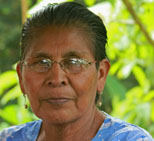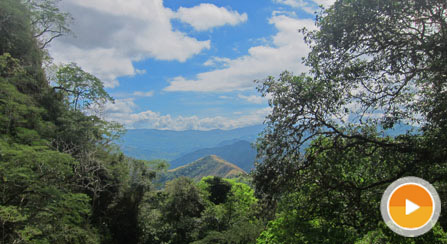“We continue. We continue fighting because there are many things that strike us, that hit us and try to destroy us, but we continue to fight despite it all. We fight to maintain — to maintain our culture, to be united for the well-being of our culture.”
bienvenidos
Boruca is an indigenous tribe in South-Pacific Costa Rica, located among the Talamanca Mountains 20 km from Panama. The Boruca tribe is estimated to have around 2,000 members and is located on an indigenous reserve, where about 140 km² of land are protected for their use. According to Costa Rican law, tribes on the reservation land, like Boruca, have the right to self-governance.
IDENTITY
Boruca (also called Brunca, Brunka or Borunca) are a proud indigenous people of Costa Rica. Their striking, hand-carved Boruca masks are so popular that imitations are sold throughout the Central American country. But the indigenous culture is more than a mask. Boruca is built on faith in the wisdom of elders and the Boruca legends they tell, passed down for centuries. The identity of Boruca reflects a deep respect for the stories told, the nature that surrounds them, and the community they share.
PAST INFLUENCES
The Boruca people are very proud to have survived the struggles between the native tribes and Spanish conquistadors in the 1500s with their village and sense of identity intact. While many indigenous tribes consider themselves to have been defeated by the Spanish, Boruca demonstrates that a tribe cannot be defeated if its culture is still alive today. Boruca is very much alive.
Though the Boruca have kept their identity intact, the Spanish colonization left an influence — most notably through the presence of the Roman Catholic church and its traditions. Spanish is now the dominant language in Boruca.
However, several of the most ancient Boruca traditions are still remembered and practiced today, and can be seen through crafts, legends, and the pride of the Boruca in identity and tradition.
Since their efforts to resist Spanish colonization, Boruca’s history hasn’t been easy. Eventually, farming alone was not enough to sustain their tribe and the people were experiencing extreme poverty. As a result, in 1970 a group of women led by Margarita Moralez united with the focus of reclaiming the original Boruca crafts and traditions that made their people distinct. The group formed as the association La Flor de Boruca.
Over the next 30 years, they had a clear impact on the economy by increasing sales of crafts and focusing on both Costa Rica ecotourism and ethnotourism. In 1985 they were aided by the National Museum of Costa Rica in establishing a museum through which to tell the story of Boruca.
TODAY
Today, the Boruca are still fighting to preserve their identity. The historical struggle against the Spanish continues to influence present day efforts to maintain the Boruca identity despite the changing culture. From their mask-making, the Dance of the Devils, and the unusual story of a group of women organizing to turn the economy around, daily life in Boruca has changed to focus on cultural preservation.
An annual festival, Dance of the Devils (Baile de los Diablos), also called Game of the Little Devils (Juego de los Diablitos), is important to the Boruca people in many ways. It celebrates the resistance to Spanish colonization and their ability to maintain an identity rich with their own traditions in the face of foreign influence. During the festival, which runs from Dec. 30 to Jan. 2, the village celebrates with a four-day depiction of Spaniards being chased off by the Boruca. The Spanish are represented by a bull costume and the Boruca wear their traditional devil masks.
Inspired by the success of La Flor de Boruca, other organizations have formed, focusing on the survival of Boruca traditions. Today, an estimated 80 percent of Boruca sell handmade crafts out of their homes, local shops and by shipping them to other areas of Costa Rica.
Other efforts to maintain the identity of Boruca include teaching both culture and the ancient Boruca language in their school.
Explore the site to learn more about culture, crafts, legends, food, visiting and the people that make the Boruca identity unique today.
“Respect is what the elders left us in their testimony and in their culture.”

“The culture always remains throughout many people, the knowledge of the elders, life itself, and the people of the community.”

“..I feel happy, because I know that in the heart of everyone that comes with me they leave with something in their hearts, just like everyone in my community has.”


